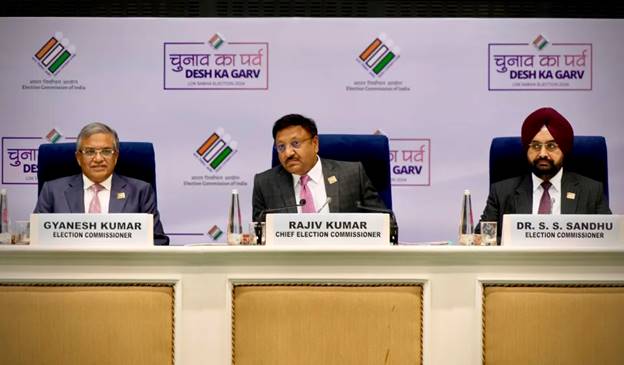
Chief Election Commissioner of India, Rajiv Kumar, speaks at a press conference to announce dates for the national elections, in New Delhi, India, Saturday, March 16, 2024 - AP Photo/Manish Swarup
Religious Tensions Loom Large as India’s Election Set for April
Narendra Modi is the favorite to win a record third term as prime minister but opponents accuse him of exploiting divisions with an anti-Muslim citizenship law
The “festival of democracy” will roll across the country in different states from April 19 to June 1 at more than a million polling stations staffed with 15 million polling and security officers, said Rajiv Kumar, the chief election commissioner. “We will take democracy to every corner of the country [for] an overwhelming experience for our voters,” he said.
The schedule could only be announced after the government rushed to appoint two new commissioners to join Kumar on the three-person board — a controversial process that is being challenged in the country’s supreme court.
Even before the official launch, de facto campaigning has been in full swing, with Modi on a national tour promoting government economic achievements and unveiling new infrastructure projects.
Rahul Gandhi , the leader of the opposition Congress party and the son, grandson and great-grandson of former prime ministers, will join a mass rally with allies from powerful regional parties in Mumbai on Sunday at the end of a 4,100-mile swing across 15 states.
The opposition bloc has accused Modi’s government of stirring tensions ahead of the election with the sudden announcement of the implementation of new citizenship laws.
Modi is the clear favorite for re-election and enjoys stellar approval ratings in the region of 75 per cent
X: Narendramodi
The Citizenship Amendment Act, which triggered violent protests when it was passed in 2019, has made religion a criterion to become an Indian citizen for the first time.
The law allows fast-track citizenship for refugees from Afghanistan, Bangladesh and Pakistan, but Muslims are explicitly excluded.
Amit Shah, the minister of home affairs and Modi’s right-hand man, said the government was merely enacting its “sovereign rights”. But critics claimed it was playing the “religion card” to its Hindu voting bloc to engage in crude communal politics.
The BJP won a parliamentary landslide in 2019 , while securing less than 38 per cent of the vote, by sweeping the Hindi-speaking north and west. It benefited from the first-past-the-post system and an opposition split between Congress and regional groupings. The BJP and its smaller allies won 353 of the 543 seats.
This year Congress and several state parties have largely negotiated deals to put up a single nominee against BJP candidates in the hope of unifying opposition support. But their alliance is widely viewed as fractious and unstable.
BJP leaders have ambitiously targeted 400 seats in the new parliament — possibly to secure the two-thirds majority needed to remove the country’s constitutional status as secular, long a goal for many Hindu activists.
The elections are parliamentary. But the BJP messaging is presidential, overwhelmingly focused on Modi, who enjoys stellar approval ratings — rising to 75 per cent in the most recent poll, last month.
“The PM is our greatest campaigner, he has tremendous energy, telling the people of our achievements, all backed by the Modi guarantee that he’ll fulfil his promises,” said Sudesh Verma, a senior BJP spokesman.
The prime minister is carried into the election on the back of the fastest-growing major economy in the world, with GDP growth hitting 8.4 per cent in the last quarter of last year.
Rahul Gandhi, the leader of the opposition Congress party, has campaigned across 15 states in his bid to beat Modi. An opposition rally in Mumbai to mark the end of the tour is expected to draw large numbers on Sunday.
EPA
The nation of 1.4 billion people is forecast to become the third-largest global economy by the end of the decade. But Congress and its allies argue that the headline figures mask poor job growth and the gains of the wealthy elite while the poor struggle.
Modi’s surge in the ratings came in the weeks after he inaugurated a new temple to the Hindu god Ram in Ayodhya at the site, revered as the deity’s birthplace, where a mosque was destroyed by protesters in 1992.
Nearly eight million pilgrims have visited the complex since the large religious opening ceremony in January, which was boycotted by opposition leaders who accused the BJP of fomenting religious divisions.
Verma described as “nonsense” claims that the BJP was playing the “religion card”. He said: “The largest proportion of beneficiaries of government welfare are Muslims. Worshipping Lord Ram is not discrimination. We are all the same racial stock, it’s just that some Indians converted generations ago.”
But Gaurav Gogoi, the deputy leader of Congress in parliament, said: “Everything takes a back seat to religion for Modi and his government. India is a pluralistic country. They are selling hype about an economy that makes oligarchs even richer while poverty and crime rise and our society is increasingly polarized and fractured.” London Times

